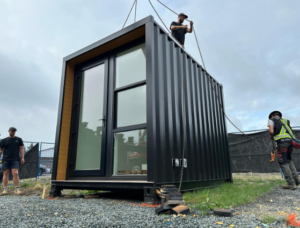
Pioneering Green Urbanism with Modular Pods
In the quest for sustainable urban development, architects and city planners are increasingly turning to innovative solutions. Among these, the concept of modular pods made from repurposed shipping containers is gaining traction.
This approach offers a sustainable solution to housing shortages while fostering the creation of adaptable urban environments.
Let’s take a look on how these modular pods are reshaping the future of urban living.
The Eco-Friendly Edge of Modular Pods
Modular pods, constructed from repurposed shipping containers, stand at the forefront of sustainable architecture. Their rising popularity owes much to their triple benefits of versatility, affordability, and environmental responsibility.
By repurposing containers that would otherwise languish in landfills, these pods actively contribute to waste reduction and environmental conservation. This eco-conscious approach not only reduces the strain on landfill capacities but also minimizes the need for additional raw materials, thus conserving natural resources. Furthermore, the construction process involved in converting shipping containers into livable spaces generates fewer carbon emissions compared to traditional building methods, making modular pods an inherently eco-friendly housing solution.
With each pod representing a testament to recycling and sustainability, they showcase a practical way forward for responsible urban development.
How Modular Pods Redefine Urban Space
The adaptability and flexibility inherent in modular pods fundamentally redefine the concept of urban living.
Unlike conventional housing structures, which are often static and inflexible, modular pods offer a dynamic approach to space utilization. Their modular design allows for easy reconfiguration and relocation, enabling seamless adaptation to changing needs and preferences. This inherent flexibility not only makes modular pods suitable for various housing scenarios, including temporary shelters and transitional living arrangements but also enhances their resilience in the face of unforeseen challenges such as natural disasters or urban redevelopment projects.
Additionally, the ability to stack or combine pods opens up exciting possibilities for creating multi-use complexes that foster community engagement and social interaction within urban neighborhoods. By blurring the lines between permanence and adaptability, modular pods redefine urban space as fluid, responsive, and inclusive.
Modular Pods as Catalysts for Urban Innovation
Beyond their physical attributes, modular pods serve as catalysts for urban innovation, particularly in the realm of smart cities. By integrating IoT technology and automation systems, these pods transform into interconnected living spaces that optimize resource usage, enhance security, and elevate the overall quality of life for residents.
From energy-efficient appliances and smart thermostats to advanced security features and remote monitoring capabilities, modular pods offer a glimpse into a future where technology seamlessly integrates with everyday urban life.
By harnessing the power of data and connectivity, these smart pods not only reduce energy consumption and operational costs but also enhance the overall sustainability and resilience of urban infrastructure. As cities evolve to meet the challenges of the 21st century, modular pods stand poised to play a pivotal role in shaping the urban landscape of tomorrow.
Case Study: West Coast Container Homes
Among the pioneers in the modular pod industry, West Coast Container Homes stands out as a beacon of innovation and sustainability.
Based on Vancouver Island, Canada, this leading builder specializes in designing and constructing custom modular pods that marry style with eco-consciousness. By transforming shipping containers into sleek, modern dwellings tailored to their clients’ needs, West Coast Container Homes showcases the transformative potential of modular architecture.
Their commitment to quality craftsmanship and environmental stewardship sets a high standard for the industry, demonstrating how modular pods can revolutionize urban living while minimizing their ecological footprint.
Through their innovative designs and forward-thinking approach, West Coast Container Homes exemplifies the promise of modular pods as a sustainable solution for future urban development.
Conclusion
As cities face the challenges of rapid urbanization and climate change, the demand for sustainable housing solutions continues to grow. Modular pods made from shipping containers offer a compelling response, providing a pathway towards greener, smarter cities. With their emphasis on sustainability, adaptability, and innovation, modular pods have the potential to reshape the urban landscape and create more inclusive, resilient communities.
Embracing innovative approaches like modular pods will be essential in building cities that are not only environmentally sustainable but also socially equitable and technologically advanced.
Learn more about modular pods and sustainable living at West Coast Container Homes